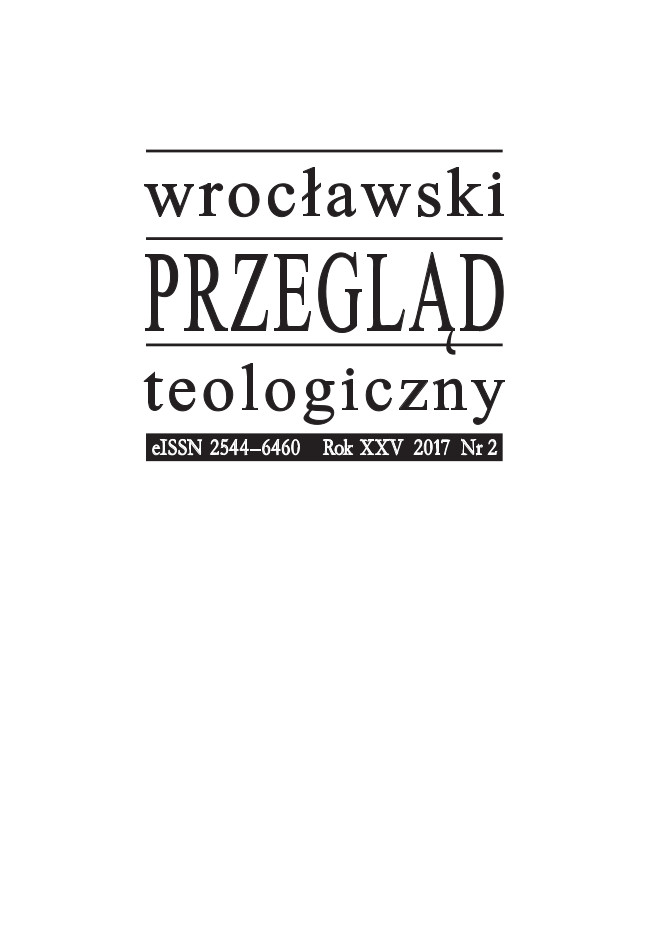Trydencka nauka o obecności Chrystusa w Eucharystii w ujęciu Josepha Ratzingera
Tridentine Teaching about the Presence of Christ in the Eucharist by Joseph
Ratzinger
Author(s): Włodzimierz WołyniecSubject(s): Christian Theology and Religion, Theology and Religion, Systematic Theology
Published by: Papieski Wydział Teologiczny
Keywords: the presence of Christ;Eucharistic forms;the transubstantiation;the consubstantiation;Body of Christ; Blood of Christ;the substance;the offering of Christ; the death of Christ; the corporeality;
Summary/Abstract: From the teaching of the Council of Trent four reasons stem for which the presence of Christ under Eucharistic forms is special and exceptional. First the Council speaks that this presence is „true, real and substantial” (vere, realiter, substantialiter). This a way of the presence of Our Lord results of the divine revelation transferred in evangelical stories about the establishment of Eucharist (Mt 26,26-28; Mk 14,22-24; Łk 22,19-20). One can, however, suppose that on the conciliar formulation, first of all, on the formulation about „the true” (vere) presence, also had the text of J 6,55 an influence. The second reason to the state prior and permanent presence of Christ under Eucharistic forms. The council notices that as far as Christ the Lord is present in other sacraments during their reception, all the more under Eucharistic forms He is present right after the transsubstantiation and before the reception of the Holy Sacrament by the faithful, and also rimains present in them after the taking of the sacrament. The third reason is the presence of the entire Christ with the flesh and blood, with the soul and the deity under every from the figure. Your flesh and Your blood are present on the strength of sacramental words, the soul of Christ is present on the strength of the natural connection and the coexistence of the flesh and the soul in human nature, whereas the deity of Christ is present on the strength of the hypostatical union of two natures in the person of the Son of God. The last reason concerns transformation that is the transubstantiation. The council underlines that the entire substance of the bread changes into the substance of the Body of Christ and the entire substance of wine changes into the substance of Blood of Christ, therefore, there are no consubstantiation.Joseph Ratzinger concentrates attention on the substantial presence. In his opinion, modern theology must restore the original sense of the concept of the substancje, which means the existence of the thing in itself and that is, what is most important, though invisible in contrasted with the external sign of the thing and the visible phenomenon. Therefore, what happens during the transubstantiation in Eucharist, takes place outside the physical realm and is not perceptible by the eye. However, what is most important changes, that is the substance of the thing (the bread and wine) into the substance of the Person. While the substance of the thing exists for itself in an autonomous way, in as much the substance of the Person - to the contrary - exists not for itself, but for the other and in relation to the second. The substantial presence of Christ cannot be understood statically, but dynamically. Christ the Lord puts into the context of the paschal feast the novel of his beneficial offering. His death becomes for us a source of new life. Crucified and risen from the dead our Lord introduces us in the life of the trynitary God permiting to transgress ourselves. In Eucharist the transformation of the entire kosmos also begins. The substantial presence of Christ is a bodily presence. The body of the Resurected Lord belongs to the new reality, exceeding all the space. As contrasted with Adam's body which can be a limit or a community, the new body of the Resurected is only a community, chich means not the state of a border separating us from one another, but is a platform connecting Christ with others. Therefore, the new resurected body is called the spirit giving life, while the earthly Adam's body may be of no use (J 6,63).
Journal: Wrocławski Przegląd Teologiczny
- Issue Year: 25/2017
- Issue No: 2
- Page Range: 7-18
- Page Count: 12
- Language: Polish

